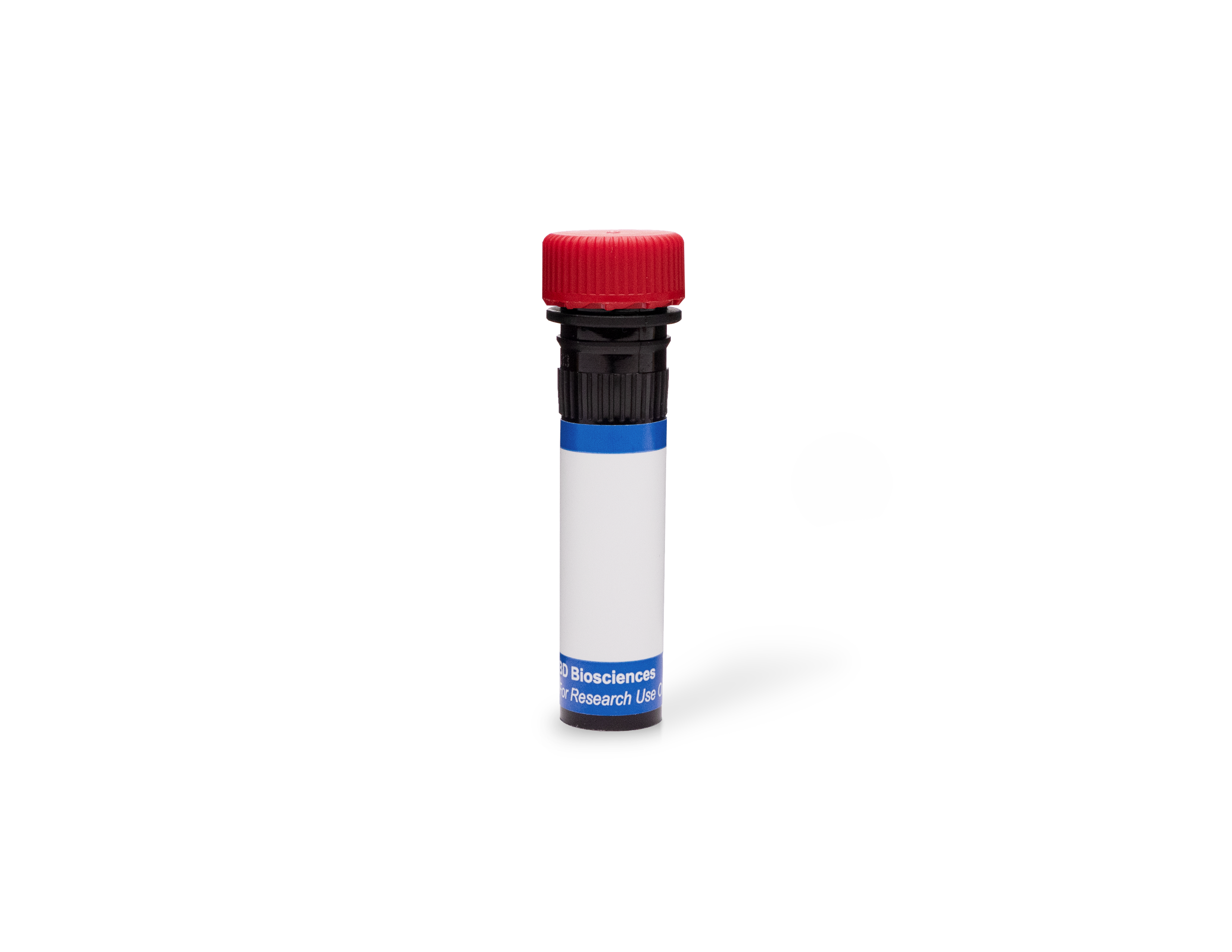


1/2

品牌: BD Pharmingen
 下载产品说明书
下载产品说明书 用小程序,查商品更便捷
用小程序,查商品更便捷



 收藏
收藏
 对比
对比 咨询
咨询反应种属:
Mouse (QC Testing)
Mouse (QC Testing)
来源宿主:
Rat SD, also known as Sprague-Dawley (outbred) IgG2a, λ
Rat SD, also known as Sprague-Dawley (outbred) IgG2a, λ
产品介绍
产品信息
耦联标记
PE

抗原名称
CD274

宿主
Rat SD, also known as Sprague-Dawley (outbred) IgG2a, λ

免疫原
DBA/2 mouse lymphoma L5178Y transfected with Pdcd1lg1 cDNA

简单描述
The MIH5 monoclonal antibody specifically binds to CD274, also known as B7-H1 or PDL1, a 43-kDa glycoprotein encoded by the
Pdcd1lg1
gene of the B7 family of the Ig superfamily.
Pdcd1lg1
mRNA is expressed in more tissues than other members of the B7 family; transcripts are found in lymphoid tissues and many, but not all, non-lymphoid tissues. The protein has been detected at low levels on resting peripheral T and B lymphocytes, macrophages, and dendritic cells. B7-H1 mRNA and protein expression are upregulated upon activation of T and B cells, macrophages, dendritic cells, and epidermal keratinocytes by a variety of stimulatory factors. B7-H1's receptor, PD-1, contains an ITIM (
I
mmunoreceptor
T
yrosine-based
I
nhibitory
M
otif) on its intracytoplasmic region and is expressed on activated B and T lymphocytes, suggesting that B7-H1-PD-1 interaction may be involved in the negative regulation of immune responses. The second PD-1 ligand, B7-DC (PD-L2), is also a member of the B7 family of the Ig superfamily. Furthermore, B7-H1 may participate in positive immunoregulation, or costimulation of T cells, through an additional receptor, which is not PD-1 and distinct from the alternate receptor for B7-DC. The MIH5 antibody blocks the binding of PD-1-Ig to B7-H1 transfectants.

商品描述
The MIH5 monoclonal antibody specifically binds to CD274, also known as B7-H1 or PDL1, a 43-kDa glycoprotein encoded by the
Pdcd1lg1
gene of the B7 family of the Ig superfamily.
Pdcd1lg1
mRNA is expressed in more tissues than other members of the B7 family; transcripts are found in lymphoid tissues and many, but not all, non-lymphoid tissues. The protein has been detected at low levels on resting peripheral T and B lymphocytes, macrophages, and dendritic cells. B7-H1 mRNA and protein expression are upregulated upon activation of T and B cells, macrophages, dendritic cells, and epidermal keratinocytes by a variety of stimulatory factors. B7-H1"s receptor, PD-1, contains an ITIM (
I
mmunoreceptor
T
yrosine-based
I
nhibitory
M
otif) on its intracytoplasmic region and is expressed on activated B and T lymphocytes, suggesting that B7-H1-PD-1 interaction may be involved in the negative regulation of immune responses. The second PD-1 ligand, B7-DC (PD-L2), is also a member of the B7 family of the Ig superfamily. Furthermore, B7-H1 may participate in positive immunoregulation, or costimulation of T cells, through an additional receptor, which is not PD-1 and distinct from the alternate receptor for B7-DC. The MIH5 antibody blocks the binding of PD-1-Ig to B7-H1 transfectants.

同种型
Rat SD, also known as Sprague-Dawley (outbred) IgG2a, λ

克隆号
克隆 MIH5 (RUO)

浓度
0.2 mg/ml

产品详情
PE
R-Phycoerythrin (PE), is part of the BD family of Phycobiliprotein dyes. This fluorochrome is a multimeric fluorescent phycobiliprotein with excitation maximum (Ex Max) of 496 nm and 566 nm and an emission maximum (Em Max) at 576 nm. PE is designed to be excited by the Blue (488 nm), Green (532 nm) and Yellow-Green (561 nm) lasers and detected using an optical filter centered near 575 nm (e.g., a 575/26-nm bandpass filter). As PE is excited by multiple lasers, this can result in cross-laser excitation and fluorescence spillover on instruments with various combinations of Blue, Green, and Yellow-Green lasers. Please ensure that your instrument’s configurations (lasers and optical filters) are appropriate for this dye.

PE
Yellow-Green 488 nm, 532 nm, 561 nm
496 nm, 566 nm
576 nm
应用
实验应用
Flow cytometry (Routinely Tested)

反应种属
Mouse (QC Testing)

目标/特异性
CD274 (PD-L1)

背景
别名
B7-H1, PD-L1; PD1L1; Programmed death ligand 1

制备和贮存
存储溶液
Aqueous buffered solution containing ≤0.09% sodium azide.

保存方式
Aqueous buffered solution containing ≤0.09% sodium azide.
文献
文献
研发参考(9)
1. Ansari MJ, Salama AD, Chitnis T, et al. The programmed death-1 (PD-1) pathway regulates autoimmune diabetes in nonobese diabetic (NOD) mice. J Exp Med. 2003 July; 198(1):63-69. (Biology).
2. Carreno BM, Collins M. The B7 family of ligands and its receptors: New pathways for costimulation and inhibition of immune responses. Annu Rev Immunol. 2002; 20:29-53. (Biology).
3. Dong H, Chen L. B7-H1 pathway and its role in the evasion of tumor immunity. J Mol Med. 2003 May; 81(5):281-287. (Biology).
4. Freeman GJ, Long AJ, Iwai Y, et al. Engagement of PD-1 immunoinhibitory receptor by a novel B7 family member leads to negative regulation of lymphocyte activation. J Exp Med. 2000; 192:1027-1034. (Biology).
5. Liu X, Gao JX, Wen J, et al. B7DC/PDL2 promotes tumor immunity by a PD-1-independent mechanism. J Exp Med. 2003; 197:1721-1730. (Biology).
6. Tamura H, Dong H, Zhu G, et al. B7-H1 costimulation preferentially enhances CD28-independent T-helper cell function. Blood. 2001; 97(6):1809-1816. (Biology).
7. Tsushima F, Iwai H, Otsuki N, et al. Preferential contribution of B7-H1 to programmed death-1-mediated regulation of hapten-specific allergic inflammatory responses. Eur J Immunol. 2003; 33(10):2773-2782. (Biology).
8. Wang S, Bajorath J, Flies DB, Dong H, Honjo T, Chen L. Molecular modeling and functional mapping of B7-H1 and B7-DC uncouple costimulatory function from PD-1 interaction. J Exp Med. 2003; 197:1083-1091. (Biology).
9. Yamazaki T, Akiba H, Iwai H, et al. Expression of programmed death 1 ligands by murine T cells and APC. J Immunol. 2002; 169(10):5538-5545. (Immunogen).

数据库链接
Entrez-Gene ID
60533

参考图片
声明 :本官网所有报价均为常温或者蓝冰运输价格,如有产品需要干冰运输,需另外加收干冰运输费。






 危险品化学品经营许可证(不带存储) 许可证编号:沪(杨)应急管危经许[2022]202944(QY)
危险品化学品经营许可证(不带存储) 许可证编号:沪(杨)应急管危经许[2022]202944(QY)  营业执照(三证合一)
营业执照(三证合一)